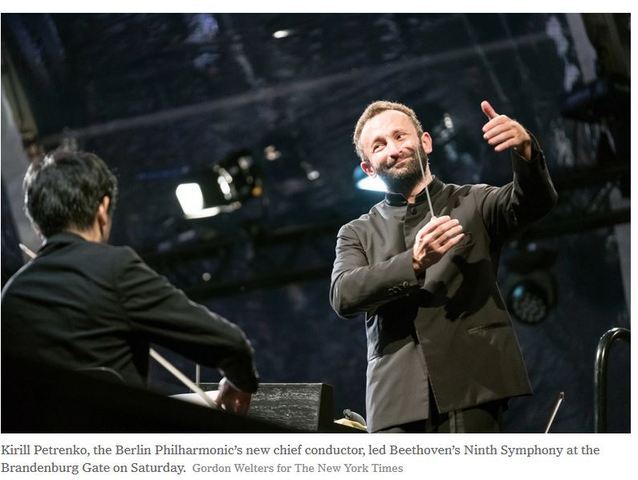



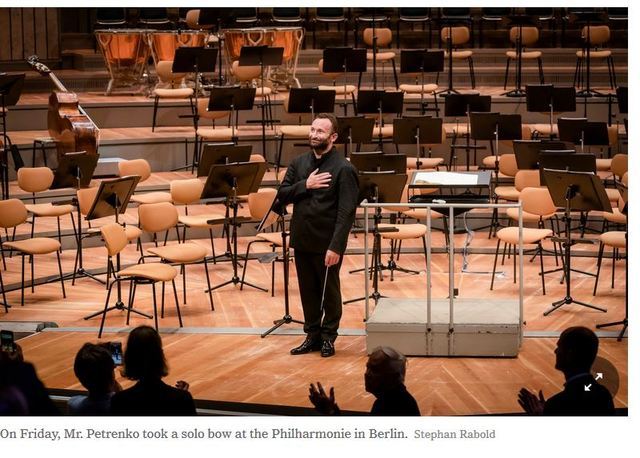
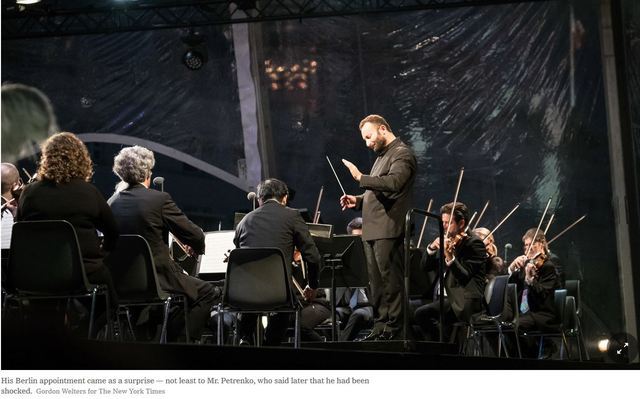
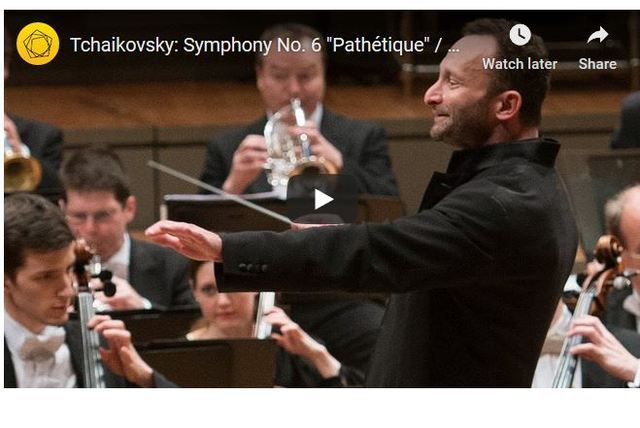
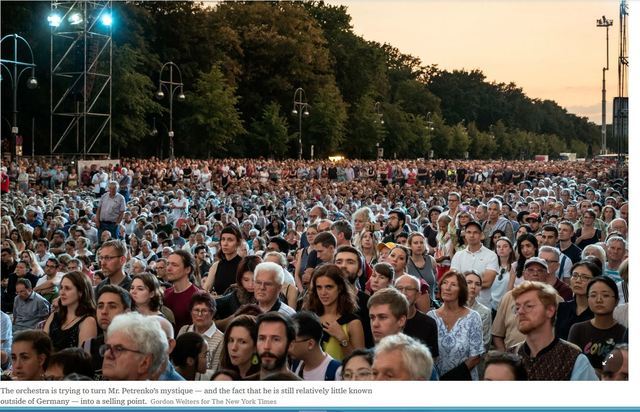
The Berlin Philharmonic’s Anti-Anti-Maestro
Kirill Petrenko, the storied orchestra’s new chief conductor, avoids interviews and recordings. But artists adore him.
By Michael Cooper
Published Aug. 26, 2019
Updated Aug. 27, 2019, 7:12 a.m. ET
BERLIN — There are standard-issue maestro activities that Kirill Petrenko — who has just ascended to one of classical music’s most storied posts: chief conductor of the Berlin Philharmonic — simply does not do.
He does not give press interviews. He does not schmooze with artists. He releases hardly any recordings. He limits his conducting to a few choice orchestras.
Bucking the Instagram era of self-promotion, there was no image of him on the posters advertising the open-air performance of Beethoven’s Ninth Symphony that he led on Saturday evening at the Brandenburg Gate, drawing a crowd of 20,000 to inaugurate his tenure.
“I prefer,” he explained affably at a news conference here in 2016, when he signed his contract, “to speak through my work on the podium.”
Now, as he takes up the post — joining a pantheon including Wilhelm Furtwängler, Herbert von Karajan, Claudio Abbado and Simon Rattle — Mr. Petrenko, 47, is complicating discussions about the role of a modern conductor. If the old school of forbidding, aloof maestros was succeeded by new generations of determinedly accessible “anti-maestros” who saw outreach of all kinds as central to their jobs, does that make Mr. Petrenko — with his focus on pure music-making and the standard repertory — a kind of … anti-anti-maestro?
“He is such a winning person, but so shy,” said Nikolaus Bachler, the general manager of the Bavarian State Opera in Munich, who gave Mr. Petrenko his first job more than two decades ago, at the Vienna Volksoper. When the State Opera, where Mr. Petrenko is finishing an acclaimed period as music director, wanted a portrait of him, it went with a video installation that showed only his hands, conducting Wagner’s “Götterdämmerung.”
Behind the scenes, musicians adore working with him — the star tenor Jonas Kaufmann said there was nobody more reassuring in the pit when something went awry — but few seem to know him well.
“I once forced him to drink a beer with me,” Mr. Kaufmann said. When Mr. Petrenko wanted to chat one night about an upcoming project, Mr. Kaufmann suggested a beer across the street after the performance.
“He came, he ordered a teeny-weeny beer, and then he talked,” Mr. Kaufmann recalled. “He had maybe 10 minutes to talk, and didn’t touch the beer. Then he took the beer, drank it in one” — Mr. Kaufmann mimed a swig — “and said, ‘O.K., have a nice evening.’”
Mr. Petrenko was born in Omsk, Siberia, where, he once said, “small children could stay home when it was minus 34 degrees; the older ones had to freeze until it reached minus 38.” His family was musical: His father was concertmaster of the local orchestra, and his mother was a dramaturg. When he was around four, he recalled in a 2010 interview, his parents would frequently bring him to work, and he got his first glimpse of a conductor.
“He paralyzed me, because in my eyes and ears this was someone who created the most beautiful sounds I ever heard,” Mr. Petrenko said in the interview. “And I realized: If I want to become something, I want to become this man.”
His family left Siberia — they were among the many Russian Jews leaving the country at the time — and moved to Austria when he was 18, and Mr. Petrenko continued his musical studies in Vienna. When he graduated, Mr. Bachler, who was then the director of the Volksoper, hired him as a coach and conductor.
“When he first took over a rehearsal, I was there,” Mr. Bachler said. “I stood up, looking at what this boy was doing. It was, from the first moment, so special.”
His next stop was Meiningen, a small German theater with a rich history where he became general music director in his late 20s — and had his first big success conducting Wagner’s epic, demanding “Ring” cycle. The Petrenko work ethic was already coming into focus at his next post, as music director of the Komische Oper Berlin. Andreas Homoki, who was then its general director, invited the company of Strauss’s “Der Rosenkavalier” to a party on their day off before the final dress rehearsal.
“He looked at me as if I was crazy,” Mr. Homoki said. “Because he had sat down and worked until the middle of the night, until 3 or 4 o’clock, listening to a recording of the rehearsal and writing things into the scores for the musicians.”
Mr. Petrenko’s conducting has helped make Munich the envy of the opera world. But although many of his performances there were filmed for live streams, he has been reluctant to release them commercially. Mr. Bachler recalled asking Mr. Petrenko to consider releasing one on DVD.
“He said, ‘Let me listen,’” Mr. Bachler recalled. “Then he said, ‘No, we cannot. Because there are 85 mistakes, and those are only the mistakes I did.’”
His Berlin appointment came as a surprise — not least to Mr. Petrenko, who said later that he had been shocked.
The Philharmonic is a self-governing orchestra. When its players first met in 2015 to elect a successor to Mr. Rattle — who had pushed the orchestra to modernize with ambitious outreach initiatives and daring programming — they initially failed to reach a consensus. (The most discussed candidates, at least in public, included Christian Thielemann and Andris Nelsons, but Mr. Petrenko, revered for his way with the core Central European Romantic repertoire, was always in the running.)
The players met again a month later and elected Mr. Petrenko — who had only performed with them three times, but wowed them. A sour note was struck when some German press accounts, noting that Mr. Petrenko would be the first Jewish conductor of the Berlin Philharmonic, were condemned for including anti-Semitic stereotypes.
A conductor reluctant to record would seem an odd fit in Berlin, long one of the world’s most CD-happy orchestras. The orchestra recently started its own label, as well as a streaming platform, the Digital Concert Hall.
But Mr. Petrenko is adapting. He has already allowed the orchestra to release his first recording with them, of Tchaikovsky’s Sixth Symphony, and he has embraced the Digital Concert Hall, even giving some interviews on it to his musicians. He is also planning some outreach, including leading students in Puccini’s “Suor Angelica”at Berlin’s Tempelhof, a former airport, and conducting future family concerts.
At the first rehearsal for Beethoven’s Ninth, Mr. Petrenko made a proposal: If the players observed all the dynamic markings in their scores, they would be able to delve more deeply into other areas.
“He said, ‘Please, if we can just do this, then we can talk about the things that aren’t on the page,’” said Matthew Hunter, a violist. “Those are the things we really want to talk about.”
Mr. Petrenko moved easily between the details of the score and discussions of Beethoven and Kant, ideas of the infinite, and Mr. Petrenko’s belief that the symphony reflected not only the positive aspects of humanity — it is, of course, famous for the “Ode to Joy” — but the negative, too. He described a pause in its final movement as a moment of silence for the dead, the fallen, the murdered. And he took special care to make sure the chorus could be heard when it sang “stürzt nieder” (“fall down”).
“If I counted the number of times I’ve played the Ninth, is it 99 times?” Mr. Hunter said. “How many times can you shed a tear? I found new tears.”
He was unafraid to push the virtuosic — and notoriously headstrong — musicians.
“What we do a lot, which I’ve never done with many conductors, is just to repeat a particular corner until it really is precise,” said Matthew McDonald, a principal bass player. “Multiple passages we did at least seven times in a row. I find it very satisfying, because it’s also how you work in the practice room: You repeat until it works.”
Now the orchestra is trying to turn Mr. Petrenko’s mystique — and the fact that he is still relatively little known outside of Germany — into a selling point. Its introductory campaign uses the hashtag #PetrenkoLive, urging people to experience his considerable energy, and they hope the scarcity of his recording catalog will draw the curious to the Digital Concert Hall to hear him.
His performance on Friday at the orchestra’s Philharmonie hall, which paired the Beethoven symphony with the soprano Marlis Petersen, a Petrenko favorite and his first artist in residence in Berlin, singing Berg’s “Lulu” Suite, was streamed online and to 145 cinemas. The following night’s extravaganza at the Brandenburg Gate was televised.
When Mr. Rattle took over 17 years ago, his record label blanketed Berlin with “Welcome, Sir Simon!” posters. Mr. Petrenko’s rollout was far more subtle — perhaps too much so.
After the last strains of the “Ode to Joy” faded on Saturday, Filipe Faustino, a 24-year-old singer from the Netherlands in the audience, said that it had been like “sugar to the ears.” But asked if he knew what the occasion was, he paused. “The Beethoven year?” he asked, alluding to the coming 250th anniversary of Beethoven’s birth.
A little behind him, Brigita Gerholdt, 69, a retired teacher, was delighted. She has listened to the Berlin Philharmonic since the long reign of Karajan, who made himself a global media star, but she said that she was intrigued by Mr. Petrenko and his understated approach.
“I think it is right,” she said, “to listen to people who are quiet.”
https://www.nytimes.com/2019/08/26/arts ... renko.html
